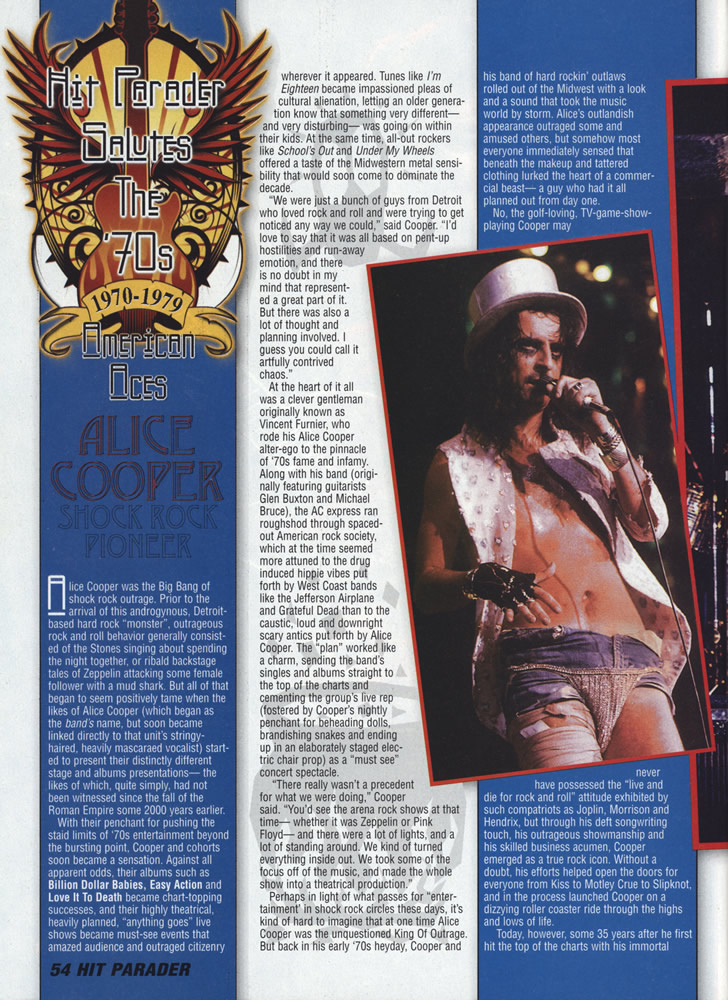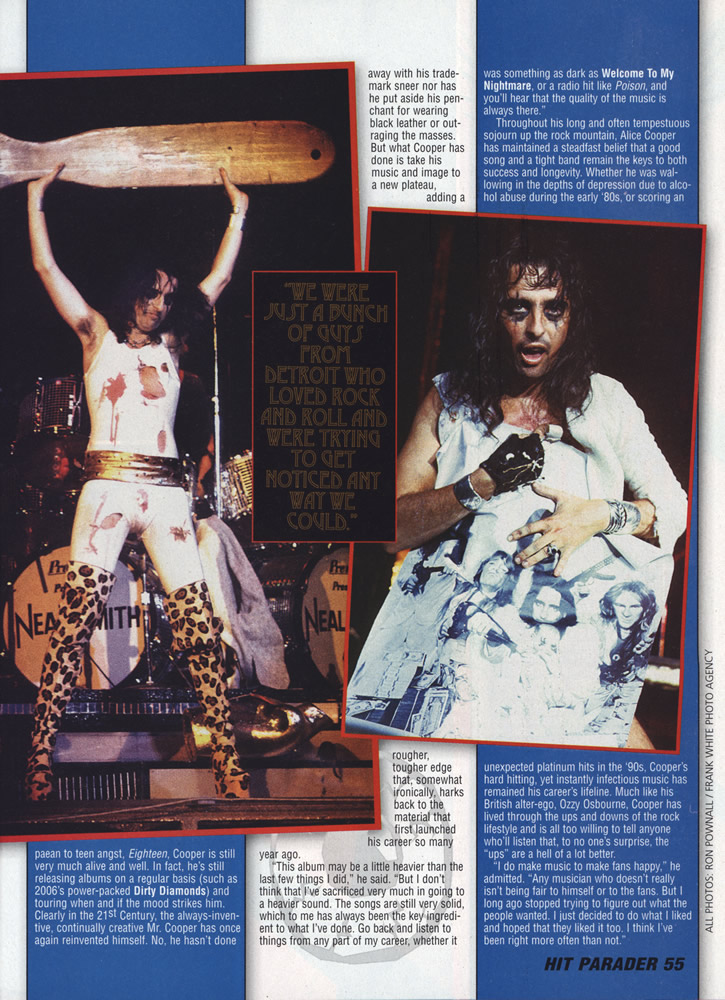Article Database

Hit Parader
June 2008
Alice Cooper Shock Rock Pioneer
Alice Cooper was the Big Bang of shor rock outrage. Prior to the arrival of this androgynous, Detroit-based hard rock "monster", outrageous rock and roll behavior generally consisted of the Stones singing about spending the night together, or ribald backstage tales of Zeppelin attacking some female follower with a mud shark. But all of that began to seem positively tame when the likes of Alice Cooper (which began as the band's name, but soon became linked directly to that unit's stringy-haired, heavily mascaraed vocalist) started to present their distinctly different stage adn album presentations - the likes of which, quite simply, had not been witnesssed since the fall of the Roman Empire some 2000 years earlier.
With their penchant for pushing the staid limits of '70s entertainment beyond the bursting point, Cooper and cohorts soon became a sensation. Against all apparent odds, their albums such as Billion Dollar Babies, Easy Action and Love It To Death became chart-topping successes, and their highly theatrical, heavily planned, "anything goes" live show became must-see events that amazed audiences and outraged citizenry wherever it appeared. Tunes like I'm Eighteen became impassioned pleas of cultural alienation, letting an older generation know that something very different - and very disturbing - was going on within their kids. At the same time, all-out rockers like School's Out and Under My Wheels offered a taste of the Midwestern metal sensibility that would soon come to dominate the decade.
"We were just a bunch of guys from Detroit who loved rock and roll and were trying to get noticed any way we could," said Cooper. "I'd love to say that it was all based on pent-up hostilities and run-away emotion, and there is no doubt in my mind taht represented a great part of it. But there was also a lot of thought and planning involved. I guess you could call it artfully contrived chaos."
At the heart of it all was a clever gentleman originally known as Vincent Furnier, who rode his Alice Cooper alter-ego to the pinnacle of '70s fame and infamy. Along with his band (originally featuring guitarists Glen Buxton and Michael Bruce), the AC express ran roughshod through spaced-out American rock society, which at the time seemed more attuned to the drug induced hippie vibes put forth by West Coast bands like the Jefferson Airplane and Grateful Dead than to the caustic, loud and downright scary antics put forth by Alice Cooper. The "plan" worked like a charm, sending the band's singles and albums straight to the top of the charts and cementing the group's live rep (fostered by Cooper's nightly penchant for beheading dolls, brandishing snakes and ending up in an elaborately staged electric chair prop) as a "must see" concert spectacle.
"There really wasn't a precedent for what we were doing," Cooper said. "You'd see the arena rock shows at that time - whether is was Zeppelin of Pink Floyd - and there were a lot of lights, and a lot of standing around. We kind of turned everything inside out. We took some of the focus off the music, and made the whole show into a theatrical production."
Perhaps in light of what passes for "entertainment" in shock rock circles these days, it's kind of hard to imagine that at one time Alice Cooper was the unquestioned King of Outrage. But back in his early '70s heyday, Cooper and his band of hard rockin' outlaws rolled out of the Midwest with a look and a sound that took the music world by storm. Alice's outlandish appearance outraged some and amused others, but somehow most everyone immediately sensed taht beneath the makeup and tattered clothing lurked the heart of a commerical beast - a guy who had it all planned out from day one.
No, the golf-loving, TV-game-show-playing Cooper may never have possessed the "live and die for rock and roll" attitude exhibited by such compatriots as Joplin, Morrison and Hendrix, but through his deft songwriting touch, his outrageous showmanship and his skilled business acumen, Cooper emerged as a true rock icon. Without a doubt, his efforts helped open the doors for everyone from Kiss to Motley Crue to Slipknot, and in the process launched Cooper on a dizzying roller coaster ride through the highs and lows of life.
Today, however, some 35 years after he first hit the top of the charts with his immortal paean to teen angst, Eighteen, Cooper is still very much alive and well. In fact, he's still releasing albums on a regular basis (such as 2006's power-packed Dirty Diamonds) and touring when and if the mood strikes him. Clearly in the 21st Century, the always-inventive, continually creative Mr. Cooper has once again reinvented himself. No, he hasn't done away with his trade mark sneer nor has he put aside his penchant for wearing black leather or outraging the masses. But what Cooper has done is take his music and image to a new plateau, adding a rougher, tougher edge that, somewhat ironically, harks back to the material that first launched his career so many years ago.
"This album might be a little heavier than the last few things I did," he said. "But I don't think that I've sacrificed very much in going to a heavier sound. The songs are still very solid, which to me has always been the key ingredient to what I've done. Go back and listen to things from any part of my career, whether it was something as dark as Welcome To My Nightmare, or a radio hit like Poison, and you'll hear that the quality of the music is always there."
Throughout his long and often tempestuous sojourn up the rock mountain, Alice Cooper has maintained a steadfast belief taht a good song and a tight band remain the keys to both success and longevity. Whether he was wallowing in the depths of depression dur to alcohol abuse during the early '80s, or scoring an unexpected platinum hits in the '90s, Cooper's hard hitting, yet instantly infectious music has remained his career's lifeline. Much like his British alter-ego, Ozzy Osbourne, Cooper has lived through the ups and downs of the rock lifestyle and is all too willing to tell anyone who'll listen that, to no one's surprise, the "ups" are a hell of a lot better.
"I do make music to make fans happy," he admitted. "Any musician who doesn't really isn't being fair to himself or to the the fans. But I long ago stopped trying to figure out what the people wanted. I just decided to do what I liked and hoped that they liked it too. I think I've been right more often than not."
Published in The Complete History Of Hard Rock a Hit Parader special June/July 2008




